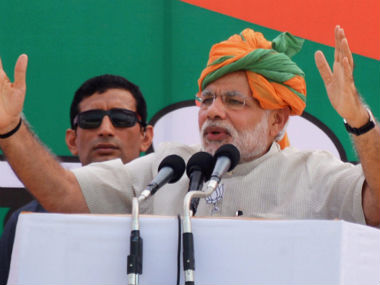New Delhi: Prime Minister Narendra Modi has anointed the state-backed broadcaster as his media brand of choice, helping shield the government from tough questions and prompting private news outlets to complain that they are being kept out of the loop. Starchy and unpolished, Doordarshan News and All India Radio (AIR) were not the obvious choice for a government that took power in May after a high-octane election campaign that used special effects to beam Modi’s image to rallies across the nation. [caption id=“attachment_1761255” align=“alignleft” width=“380”]  BJP has called this election a victory for PM Modi. PTI[/caption] But the old-fashioned outlets are expected to offer one big advantage over their slicker private rivals: a less combative and questioning platform from which Modi can get his message out to tens of millions of Indians. Carefully controlled communication has been a defining characteristic of the new government since Modi’s BJP swept to power. Critics see it as one symptom of a broader leadership style under Modi that has weakened opponents, sidelined ministers and concentrated power in the Prime Minister’s Office (PMO). Information and broadcasting minister Prakash Javadekar said Modi’s preference for the public broadcaster was not an attempt to suppress information or limit access. “I think everyone must welcome it. He has not banned anybody, his programmes are telecast live, practically on all channels, so where is the issue? There is no denying somebody access.” “There is complete freedom in our regime,” he told reporters. PMO officials were not available to comment for this story. ‘From the heart’ Modi has never given a news conference as Prime Minister, but he has been active on Facebook and Twitter, where he has over 7 million followers, bypassing traditional media and spurring editors to complain about a lack of two-way communication and debate. Now, for the first time, an Indian prime minister has a direct link to voters’ living rooms in his home. Last month, the state broadcaster set up a recording studio at Modi’s official residence where he will record “Man ki Baat”, his regular address to the nation on AIR that debuted earlier in October. Doordarshan has been contracted to build a television studio at Modi’s residence so his talk can be televised as well, according to an engineer working on the project. Separately, the government has sent a letter asking ministries to engage more with the publicly funded broadcaster, according to the India Today news website, and has given its journalists coveted spots in a significantly reduced press corps that travels with the prime minister overseas. Thirty or more journalists usually travelled with the previous prime minister. But on Modi’s recent trip to the United States, only nine — the majority from state-funded organizations — accompanied him, according to the foreign ministry. Private news outlets say diminishing interaction with the government has made their jobs harder. “There has been a lot of communication from the government, but it’s been very top-down,” said N Ravi, editor of the Hindu newspaper and president of the Editors Guild of India, which issued a statement in September calling on the government to interact more with journalists. “It’s been a one-way street.” The Guild statement noted “a certain deficit of transparency in the functioning of the government,” citing the delay in setting up a media liaison in the PMO and restricting access to ministers and bureaucrats. Bad blood? Modi has had rocky relations with the media since the 2002 Gujarat communal riots in which at least 1,000 people, mostly Muslims, died. Local and international media reported extensively on the violence, raised questions about the state government’s role and some blamed Modi for failing to stop the brutality. Modi has always denied any wrongdoing, and courts have never found sufficient evidence to prosecute him. But the relationship remained fraught. Since 2002 his aides have routinely requested journalists to present their questions in advance as a condition to secure a formal meeting with him. In 2007, Modi abruptly walked out of an interview with a private Indian news channel when he was asked whether he regretted the 2002 incidents. Modi sat through an interview with Reuters last year, dismissing concerns about his style of management and saying that he welcomed criticism because “the strength of democracy lies in criticism”. Since taking office Modi has not given an interview to the Indian media, though he has spoken with foreign news outlets ahead of trips abroad. “Even for the positives of the government to be brought out, a certain amount of access is necessary,” said NDTV political editor Rahul Shrivastava, who has covered the PMO since the mid-1990s. Now, he said, “you have to accept [information] as it comes — both in terms and quality and quantity.” In June, information and broadcasting minister Javadekar said he would give Prasar Bharati, the state body that operates AIR and Doordarshan, more autonomy and editorial freedom. The government’s new reliance on these networks may complicate that. The government asked ministries to strengthen ties with state-run broadcasters because of their national reach, Bimal Julka, secretary of Javadekar’s ministry, told Reuters. The government wants information “to penetrate to the last mile”, he said, but it is “distorted” by some private outlets and so public broadcasters also need to distribute the facts. Reuters
Carefully controlled communication has been a defining characteristic of the new government since Modi’s BJP swept to power.
Advertisement
End of Article
Written by FP Archives
see more


)
)
)
)
)
)
)
)
)



